- Home
- Jennifer Macaire
The Road to Alexander
The Road to Alexander Read online
Table of Contents
Title Page
Road to Alexander
Prologue
Chapter One
Chapter Two
Chapter Three
Chapter Four
Chapter Five
Chapter Six
Chapter Seven
Chapter Eight
Chapter Nine
Chapter Ten
Chapter Eleven
Chapter Twelve
Chapter Thirteen
Chapter Fourteen
Chapter Fifteen
Chapter Sixteen
Chapter Seventeen
Chapter Eighteen
Chapter Nineteen
Chapter Twenty
Chapter Twenty-one
Chapter Twenty-two
Chapter Twenty-three
Chapter Twenty-four
Heroes in the Dust
Chapter One
About the author
‘My son, go find a fitting kingdom;
Macedonia is too small for you.’
Philip of Macedonia to his son, Alexander
‘... and if you’re still not convinced that I have won the kingdom, fight me for it again, I shall be ready. But don’t run away, for I will follow you to the ends of the earth.’
Extract of a letter from Alexander to
Darius, King of Persia
‘Tempus edax rerum’
– (Time destroys everything)
Ovid
Saying is written in gold above the door in the Sending Room at Tempus University, Institute of Time Travel and Study.
Prologue
There are several tombs purported to be of Alexander the Great. Only I know the real one. I will tell you this much: it is a simple tomb carved in hard stone. Inside, there are the relics of a legend. There is a gold cup in the shape of a winged lion. There is a large round shield, supposedly magic, that once belonged to the great hero, Achilles. There is a long braid of pale hair. There are many well-read letters in an ebony box, for he loved mail, and there is an ancient scroll that, when carefully unrolled, reveals a copy of the Iliad. He was never without it.
He was buried alone, since he died before any of us. For that, I will always curse him. My prayer had ever been to die before him. We would have all preferred to die before he did, for we all loved him. He was our sun, our god, and the reason we lived. Without him, the world appeared much darker and smaller somehow, than it had before.
Alexander: the name is a whisper in the room, merging with the shadows. There is still an echo of him; an echo that lasted for three thousand years. Sometimes I can almost feel him standing next to me. Blue light from the glass lamp makes strange shadows on the wall, and I pause as I write this. Night is falling, and soon lions will come to the water to drink. I love to sit on the porch and watch them. My terrace is set well back from the lake, but on a hill, so I can see all the way down the coast to the river, and sometimes I can catch a glint of the sea beyond. It is a timeless place; a place where the gods have their banquets, and where man and beast still live in perfect harmony. It will change. All will change.
I am getting old now, and my hand sometimes trembles and refuses to hold the pen. Getting old bothers me more than I thought it would, but the thought of dying holds no fear for me. I even look forward to it, for, you see, how can I be afraid to die? In three thousand years, I will be born again. I will win a prestigious award and choose to interview a legend. In three thousand years, I will return to Alexander, and the story will go on. The story will never end. I am looking forward to meeting Alexander again.
Chapter One
I could not, would not, go back in time with my head shaved. But the fashion consultant ignored my protests, put the razor to my head, and swept off my hair.
That should have been a warning, but all day long I’d ignored the signs. To begin with, I couldn’t get any of my so-called friends from Tempus University to come and pick me up. They’d stopped speaking to me when I’d been chosen for the prize. It shouldn’t have bothered me. I’d never had friends before, why did I need them now? Well, they would have come in handy for a ride. The only flat I could afford after giving my money to a charity foundation was in a crappy section just outside town and there was no zip-tram nearby. When I called a taxi, he’d refused to drive up to my door and I had to walk through the garbage-strewn streets to the main station.
When I finally got to the University, the fashion consultant gave me a dress to wear that felt like it had been woven from nettles and the most uncomfortable sandals in the world. The sandals, the fashion consultant informed me, were made by a shoemaker-slash-historian from plaited grass imported directly from the Euphrates riverbanks.
Just after I’d finished dressing, the smug fashion consultant shaved me bald and gave me a most unflattering wig. Then, in another room, a surgeon gave me a shot that would temporarily protect me from all the known illnesses of the time, including pregnancy and rabies. Then he implanted my tradi-scope right above my left ear, missing the first time, and giving me a fearsome headache. I didn't complain. Besides, I needed the tradi-scope to understand all the languages I would meet.
Finally, when I was deemed dressed and coifed appropriately for 333 BC, the fashion consultant escorted me to the very centre of the Institute of Time Travel and Study, where I climbed onto the massive seat carved from a block of pure quartz crystal that would send my atoms spinning through time.
A nurse paused next to me and looked at the glowing screen by the cylinder of frozen nitrogen. ‘Only a few more minutes before you get vaporized,’ she said, and smiled.
Everyone in the room was waiting for me to fail at my undertaking or to show some sort of weakness. I leaned back in the freezing chair and pretended to yawn.
Above all, a time-travelling journalist must be in control of his or her emotions. Emotions clouded judgment. Emotions were marks against you at Tempus University. Sentiments were stomped out and clinical thinking was put in their place. I was trained to observe and to ask pertinent questions, all the while remaining detached. The Time Travel Institute was not about to spend millions of dollars to send people back in time to have them fall apart and blather.
Lightning crashed and thunder shook the building. On the glass dome above my head, rain poured like a waterfall, the sound deafening. More lighting jagged across the sky, and the white-coated scientist standing next to me glanced upwards. ‘Right on time.’ He checked his watch and then motioned curtly to a nurse standing nearby. ‘Four minutes.’
I shifted, my bones aching. The ice-cold, quartz-crystal chair beneath me seemed to vibrate with every lighting flash. Time travel uses lightning, and takes so much power that only one individual can voyage each year. The entire planet’s energy system dims for the hour it takes to send the voyager. The renown of the programme and its consequences are such that none can ignore it. In a short time, I would be among the most famous people in the world.
The programme had been invented in 2300 by scientists working for a private company based in Tempus University. At first, only inanimate objects, especially those made of quartz crystal, could be sent back in time. When it was perfected in 2900, Tempus University started their reporting programme. Because their time in the past was limited, researchers and historians had to make the most of it. It was decided they should act as journalists and concentrate on interviewing famous people. Some early experiences were resounding successes; Shakespeare, Julius Caesar and Marie Curie gave fascinating interviews. Others were failures. Jesus, for example, remained elusive. Some trips simply didn’t work out because the journalist was in the wrong place or the wrong time; but they usually came back alive.
To be chosen for the prog
ramme was akin to winning the lottery – the chances against you were millions to one. But that never bothered me. When at last I knew what I wanted to do, I went after my goal with a single-mindedness that would have put even my mother to shame. When I was chosen, the looks my fellow journalists gave me could have cut glass. Those I believed to be my friends turned out to be bitterly jealous. That shouldn’t have bothered me. Emotions were something I’d long ago learned to suppress.
But right now I was having a hard time. The visions I’d had of arriving back in time dressed in long, silk robes, my beautiful hair brushed into an intricate fashion, had shattered with the buzz of a razor and the sight of the shoddy sandals. I clenched my fists and tried to think of something else. But the something else was the present, and I was even more uncomfortable with that.
Looking upward, all that was visible was the glass dome and the water pouring upon it like black silk. Lighting flickered eerily across the night sky and, a moment later, thunder boomed. I watched as scientists and nurses bustled about taking their endless measures, whispering, checking the magnetic poles, and muttering into microphones. The chair beneath me was growing colder by the second, and next to me a chrome cylinder full of liquid nitrogen gave off freezing vapour.
‘Almost midnight.’ The nurse stepped closer. ‘Not nervous yet?’ Her look said clearly she was hoping for me to fall apart.
I didn’t answer. Silence is a shield. That had been the first lesson I’d learned. My upbringing set me apart from anyone I knew because of the fortune my parents possessed, and because I’d been unwanted. I was punished if I made noise, so I learned to keep quiet, and I wandered around our vast domain silently and alone until I was old enough to be shipped off to boarding school. Most of my mother’s friends had no idea she had a child.
My second lesson was harder. When I was sixteen I graduated from finishing school, and my mother decided to take control of my life. She married me to a man twenty years my senior, the Baron Thibault de Riveraine.
I’d never been an easy child – I’d inherited my parents’ tempers from both sides along with their stubbornness and, I’m afraid, their emotional aloofness, but it never occurred to me to protest my marriage. At the time, I thought I was escaping my mother.
My husband turned out to be worse. He was cruel, humourless, and violent. I was a virgin. He raped me on our wedding night and was brutal every night thereafter. He was careful not to bruise my face – I was his trophy wife and he liked to show me off. I left him after six months, dropping my suitcase out the window and climbing down after it like a thief in the night. It took me nearly a year to recover my self-esteem and face him again. I contacted a lawyer to arrange our divorce. My husband agreed because I’d threatened to expose him. When we finally did meet, my husband lost his temper and punched me.
The fight happened in the presence of my mother, the judge, and our two lawyers. My mother had come to court hanging onto my husband’s arm, her mouth twisted in scorn at my stupidity. I wanted a divorce and half my husband’s fortune. My husband said I could have neither.
I got both, along with my title, Baronne Riveraine. I didn’t want the title, and that was the reason my ex-husband punched me. Or, perhaps it was my laugh when the judge asked if I was sure I wanted the divorce. Whatever the cause, for the first time ever I dared hit back when he hit me. My fist flew and broke Thibault’s nose with a satisfying crunch. My mother screamed, the lawyers gasped, and I walked out of the courtroom with a black eye, a fortune, and a new goal in life. I was eighteen and I knew exactly what I wanted to do. I wanted to go back in time and meet my childhood hero, Alexander the Great. I applied to Tempus University and graduated with honours.
My attention shifted to the time-sender, a tall, severe man in a white lab coat. ‘Don’t move,’ he said. ‘The tractor beam must be set for your exact weight and mass.’
‘How does it work?’ I asked.
The scientist snorted. ‘I can’t tell you how, you won’t understand anyway. Suffice to say that you choose any person in any historic time and we send you to him or her. You are outfitted with the tradi-scope, so you speak and understand any language and idiom of that time. We provide the science, you provide the legwork.’
‘I’ve been trained for all that, you know.’ Across the top of the screen I saw numbers start to flash.
He snorted. Obviously he was sure my title and fortune had paved my way to this chair. If he read the papers, he’d know that after I’d paid for my education, I’d given my fortune away to a charity foundation. But I wasn’t going to tell him. I couldn’t care less what he thought.
‘One minute and counting,’ came the electronic voice. The nurse leaned over and spoke to me.
‘What did you say?’ I asked, keeping my eyes on the glowing needle inserted in my arm. My temperature was dropping rapidly; soon my blood would freeze. My atoms were being disconnected for their voyage into the vacuums of time. Pain bloomed, spreading from my arm to the rest of my body. My teeth began to chatter, and I wondered if I’d die. Some people did. I must have uttered a slight moan. The nurse looked at me sharply.
‘I was wondering why you chose Alexander the Great,’ she said. Then my vision darkened and I couldn’t answer, but I knew what I would say if I could.
* * *
I’d decided to interview him for several reasons. So much had been said about him, yet hardly any writings remained by his contemporaries. He’d been glorified, vilified, deified, and his myth existed in all the known languages on earth. He was represented in the four major religions.
I was curious to learn about the young man’s charisma and leadership qualities. What had made him so special? The final reason I wanted to see him was a burning passion I’d nurtured since high school for the enigmatic king. That, however, was not on the application I’d sent to the Institute of Time-Travelling Journalists. If they knew I’d turned down dates because the man didn’t measure up to my ideal of Alexander, they’d never have chosen me. An interviewer has to be able to hide his feelings. Clearly I’d succeeded. No one had realized the extent of my infatuation. I wasn’t worried about it. I was confident I would be able to control my emotions – after all, I was a modern, well-educated woman.
Alexander had already been interviewed – as had most of the people who’d made history. However, the timing had been different. The interview had been held just before his death, and he’d been delirious with fever. He hadn’t said anything of interest, and no one had gone back to see him again. Afterwards, for some reason, he’d been classified as a dangerous subject. Most first-time time-travelling journalists chose an easy interview. I wanted the prize, though, so I’d gone with the risk and it had paid off. I’d been chosen over thousands of other candidates.
Interviewers had to be careful never to give away the fact they were from the future, and they had to make sure that they didn’t alter history. The time one spent in the past was severely limited, only twenty hours. We took vows. It’s all very ‘Boy’s Club’ and ‘Scout’s Honour’ sort of stuff. Cross your heart and hope to die. Prick your finger and dab a drop of blood on the dotted line, right next to your signature. You see, the time travelling programme is so precise that if you change history, even the slightest, the scientists simply erase the part you changed, and in doing so, erase you. What’s more, if you don’t make it back to your rendezvous, you are left there to die. Your tradi-scope is disconnected, so you lose the power to understand and speak the languages of that time. Most people don’t last a week under those conditions, especially during wars, plagues, or intrigues. In the past, spies were executed without a trial, usually on the spot.
I was going back in time. I’d filled out my contract and meant to honour it. I also meant to come back and win another journalistic prize. Once tasted, success is intoxicating – and perhaps I was hoping I could prove to everyone that I was not just a spoiled little rich girl. I sought something that I’d never received: approval.
I clenched my t
eeth as intense pain exploded in my arms and legs. My chest grew tight, making breathing difficult. A solid wave of ice seemed to flow through my body. I tried to open my eyes, but all I saw were flashing white lights. I screamed then, and my last thoughts were that I was dying, that I’d failed, and that no one in that room, or anywhere on earth, would give the slightest damn.
* * *
I woke up beneath a small pomegranate tree. It was early morning, the sun was just rising and mist obscured the tops of the hills. My teeth chattered with cold, and my hands were pale blue and wouldn’t work. I lay there, shaking, until the sun’s rays finally thawed me out. When I could sit up, I had to brace myself against the tree trunk. I rested, waiting for the waves of dizziness and nausea to subside. Drops of blood ran down my chin and landed on my hands. It was just my nose. I pinched it, and waited. My head was clearing, and to my relief I found I could stand.
The sun was a pink disc on the horizon, and the mist started to dissipate. I straightened my shoulders and took a deep breath. I’d made it this far. I stood up, brushing the dirt off my robe with my tingling hands. I fingered the sash. It marked me a vestal virgin and would hopefully protect me from the common soldiers.
My head itched, my dress scratched, and every step I took with the flimsy grass sandals hurt. And I hated my stupid wig. It was the Egyptian style, reported to be the fashion rage that decade in the Tigris delta. I sincerely hoped so – I’d hate to be executed for lack of taste. In any case, I’d find out soon enough.
I waited until the sun rose fully, then made my way eastwards over low hills toward where streamers of smoke reached to the sky. Dew sparkled on the grass, wetting my feet. The air was incredibly pure, sweet and potent. I filled my lungs with it, drawing huge breaths. I’d never inhaled a breeze such as that. It was intoxicating. I inhaled the air as I walked, gulping it heartily. My journalist mind was busy ticking off details for the article I was to write. The pristine air, the diamond-bright dewdrops, the groves of date palms, and the scent of freshly ploughed fields were all part of the unfolding scene. It was still early, and the sky was pale blue. Smoke from campfires spiralled upwards and was lost in the mist. Faraway mountains faded into a lavender haze. The morning air was fresh and cool, but the shimmer on the horizon announced a brassy heat. It was going to be a scorching day.

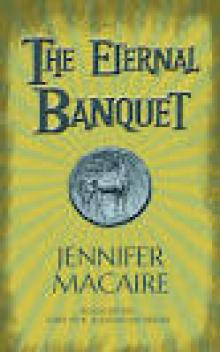 The Eternal Banquet
The Eternal Banquet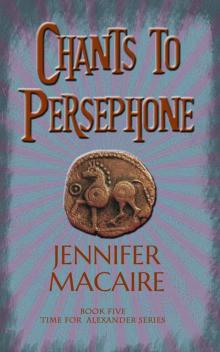 Chants to Persephone: The Future of the World Hangs on a Knife's Edge - and Only a Human Sacrifice Can Save It
Chants to Persephone: The Future of the World Hangs on a Knife's Edge - and Only a Human Sacrifice Can Save It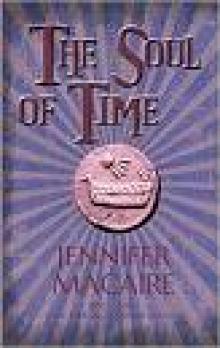 The Soul of Time
The Soul of Time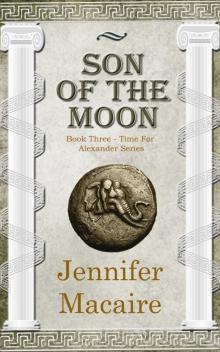 Son of the Moon
Son of the Moon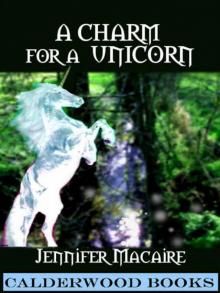 A Charm for a Unicorn
A Charm for a Unicorn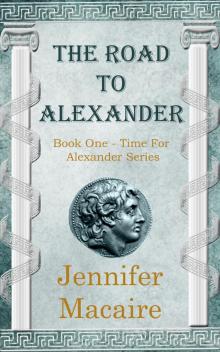 The Road to Alexander
The Road to Alexander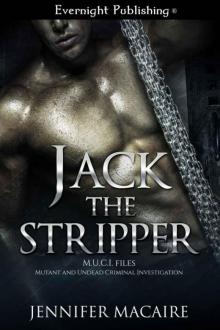 Jack the Stripper
Jack the Stripper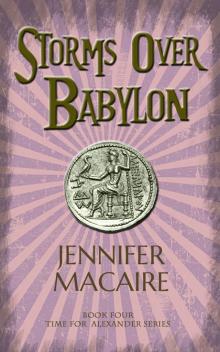 Storms over Babylon
Storms over Babylon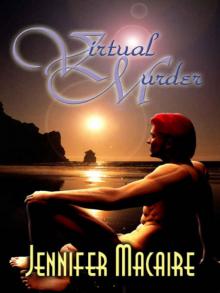 Virtual Murder
Virtual Murder